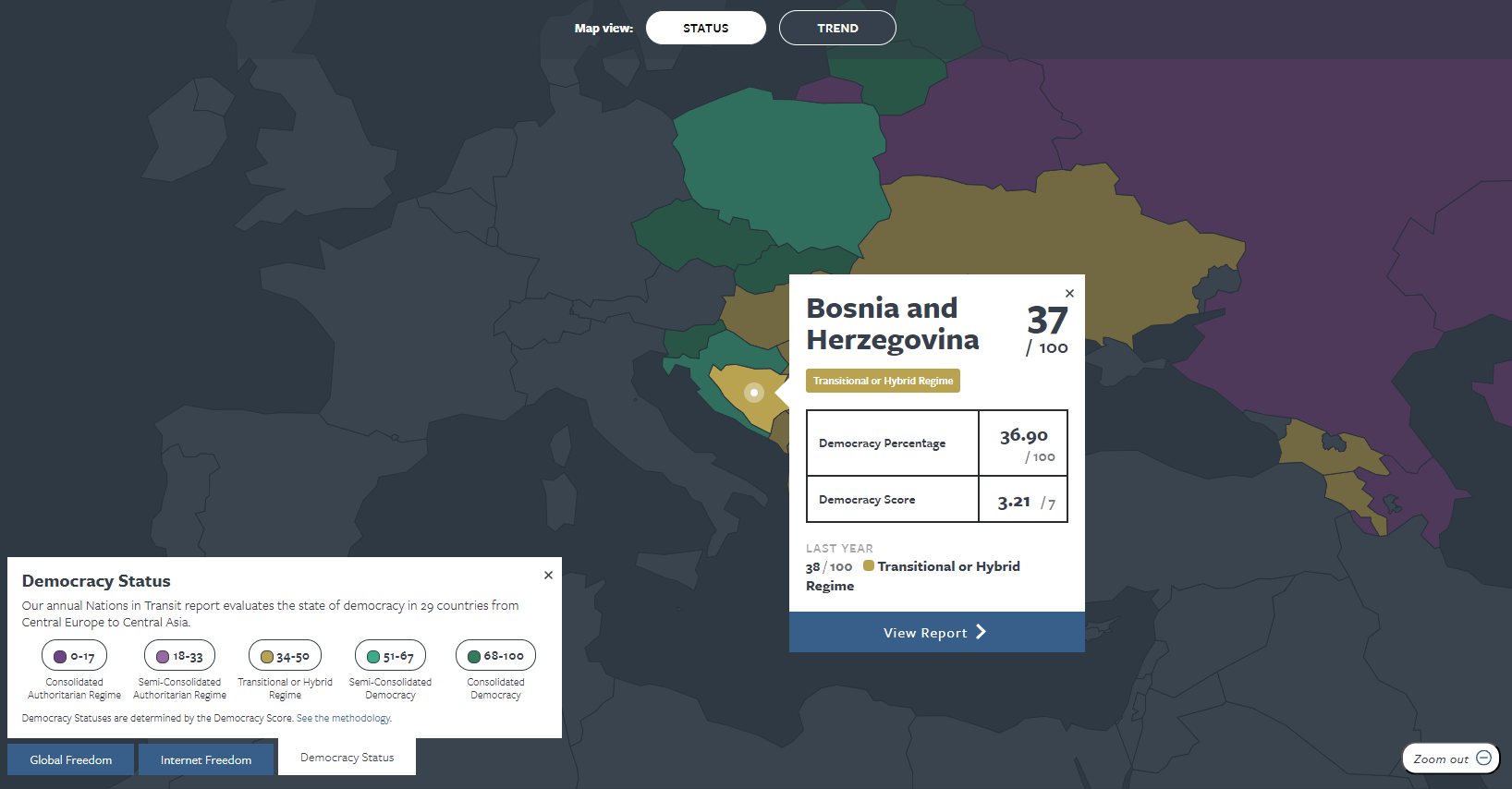Freedom House Report for 2022: Corruption and the State of Judiciary Reduce Democratic Capacity in Bosnia and Herzegovina
Bosnia and Herzegovina received a reduced rating in the latest Freedom House report for 2022,which measures the democratic capacity and the state of democracy in the countries of...

Bosnia and Herzegovina received a reduced rating in the latest Freedom House report for 2022,which measures the democratic capacity and the state of democracy in the countries of Central Europe and Central Asia, and precisely corruption and the state of judiciary were indicated as areas in which regression was recorded and due to which BiH is the worst rated country in the Western Balkans.
Bosnia and Herzegovina has retained the status of a so-called hybrid regime in which democratic institutions nominally exist, but their power is limited and captured by the interests of political elites, and it has been singled out as one of the countries that have been in that category for the longest time, for the 15th year in a row.
The biggest cause for concern is the evaluation of the democratic administration, which measures the independence, effectiveness and responsibility of the legislative and executive authorities, and this is where Bosnia and Herzegovina regressed last year and entered the category of the so-called“consolidated authoritarian regime”which is a deterioration that has not been recorded in any other state that has the status of a “hybrid regime” since this research was conducted.
These findings point to similar trends presented by the Corruption Perceptions Index (CPI) published by Transparency International, which means that Bosnia and Herzegovina, except in the area of the fight against corruption, records a constant decline in all areas that measure the degree of development of democracy and independence of institutions.
The report indicates and criticizes the attitude of the international community, i.e. its representatives towards BiH, who, in exchange for political stability, abandoned institutional reforms in key areas necessary for the development of the democratic capacity of institutions in BiH and its progress on the path of EU integration.
All these evaluations are a reflection of the fundamental lack of democracy in the government in Bosnia and Herzegovina, whose huge apparatus and decentralized character offers a wide space for corruption and abuse, reinforces divisions, and enables political leaders to hold positions and levers of power without compromise for the realization of personal and national interests at the expense of basic civil liberties.
Such evaluations are not surprising considering the wave of undemocratic laws that are being prepared at all levels in Bosnia and Herzegovina, such as amendments to the Criminal Code of the Republic of Srpska which criminalizes defamation, the Law on the Publicity of the Work of Non-Profit Organizations of the Republic of Srpska and the announcement of changes to the Law on Offenses against Public Order and Peace in Sarajevo Canton, whose role is to stifle criticism by all means, limit freedom of speech and reduce public space and the human rights.
Apart from the announcements of legal solutions that are characteristic of totalitarian regimes, all relevant research carried out by TI BiH indicates that corruption in BiH is increasingly present but also that it is not prosecuted, and that the judiciary in BiH is recognized as the main source of problems when the fight against corruption in BiH is in question. In addition to dealing with petty corruption, allowing major corruption scandals to go unpunished, the inability of the judiciary to adequately sanction failures in the work of judges and prosecutors is also worrying, which, along with numerous affairs that have affected it for years, seriously undermines the integrity and independence of the BH judiciary.
Freedom House “Countries in Transition 2023” brings worrying trends, according to which, for the nineteenth year in a row, a decline in the democratic capacity of the authorities in the countries of Central Europe and Central Asia is recorded, and draws attention to problems in the EU itself, whose 11 member states record overall decline of democracy. The reason for this, as stated in the report, is the continuation of attacks by autocratic political currents on the decreasing number of remaining laws and procedures that guarantee the freedom and independence of the media, local authorities and civil society.
As a response to the increasingly strong presence of authoritarian tendencies in the country and the increasingly widespread corruption, TI BiH, as part of the “Good Governance Agenda 2025”, presented reform directions that include rationalization and depoliticization of public administration, centralization of public procurement, mandatory voting and democratization of political parties, and the introduction of control procedure – vetting – in the judiciary.
The agenda is a way of solving the entrapment of the institutional apparatus in BiH and freeing it from the negative influence of political elites by acting on the key causes – finding corruption hotspots, reducing corruption while strengthening the participation of citizens in the decision-making process and strengthening the capacity of institutions.
Get involved
Stay tuned
Subscribe to our newsletter and receive periodic notifications about our, announcements, calls and activities via email.
Don't miss it
If you want to receive our announcements immediately after the publication, leave your e-mail address in the field below.



